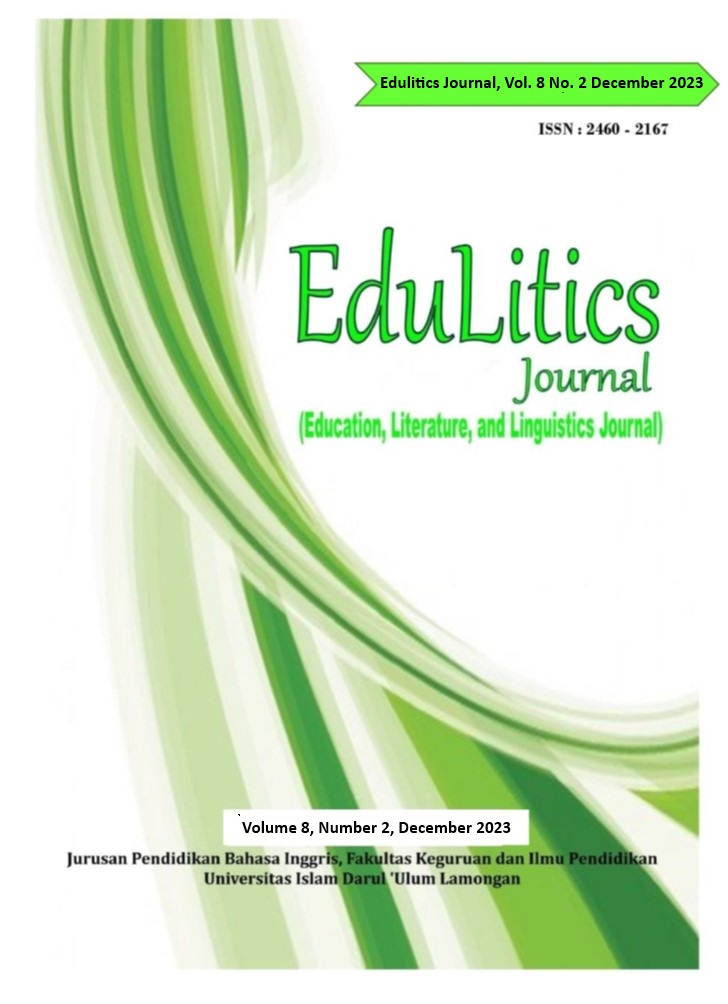Need Analysis Course Design: ESP Textbook Evaluation in The Psychology Faculty
Abstract
This study aims to describe the 'need analysis' of English for Psychology courses and evaluate the ESP textbook from the point of view of the textbook users at the Faculty of Psychology. A need analysis survey in learning ESP and ESP textbook evaluation was conducted and then analyzed quantitively. The data sources of this research were students of the Faculty of Psychology who were taken by purposive sampling, which amounted to 20 people already in the 4th, 6th, and 8th semesters, the head of the Psychology department, and three lecturers in the Psychology Faculty. The data collection used was a questionnaire and documentation. The data is in the form of questionnaire results and interviews. Documentation technique is used in collecting data, while analysis technique is used in analyzing data, namely reduction, data display, and drawing conclusions and verification. The study results show that language skill materials are crucial for future Psychology students.
Regarding speaking skills, students primarily require resources for conversing with current issues that are up-to-date. Regarding the students' need to access psychology journals and textbooks, writing and skills in composing scientific articles, reports, and lab documents are essential. However, the study reveals dissatisfaction among Psychology students with the current ESP textbook, particularly in appearance, visuals, design, layout, and writing materials. Despite some elements meeting their needs, such as layout, content, exercises, and speaking resources, improvements are needed in certain areas. Consequently, it is recommended that the ESP textbook be enhanced to better cater to these requirements, and future researchers undertaking similar studies should consider this focus on English for Specific Purposes (ESP).
Downloads
References
Aldebarant, N. N., Setyowati, Y., Bagaskara, H. S., & Priyambudi, S. (2023). Scrutinizing Discord as an Advanced Platform to Support Students’ Listening Proficiency (A Theoretical Perspective). EL2J (English Language and Literature Journal), 2(1), 44-52. https://doi.org/10.38156/el2j.v2i1.22
Asti, Y. (2020). Learners’ Need Analysis On Esp Teaching Materials at Komunikasi Penyiaran Islam Study Program of FUAD Faculty of IAIN of Bengkulu. Undergraduate Thesis: IAIN Bengkulu).
Badr, S. (2008). The effects of blended learning communicating on language apprehension and oral communication skills. Journal of Psychological and Educational Research, 23 (1), 3-53.
Bahrani, T. (2011). Speaking fluency: Technology in EFL context or social interaction in ESL context. Studies in Literature and Language, 2 (2), 162-168.
Brown, H., D. (2001). Teaching by principles: An interactive approach to language pedagogy. San Francisco: Addison Wesley Longman, Inc.
Chostelidou, D. (2011). Needs-based course design : the impact of general English knowledge on the effectiveness of an ESP teaching intervention. Procedia - Social and Behavioral Sciences, 15, 403–409. https://doi.org/10.1016/j.sbspro.2011.03.112
Damayanti, E., & Zahro, S. K. (2022). Between English and Mandarin: A Contrastive Study of Interrogative Sentences among Indonesian Textbooks. Edulitics (Education, Literature, and Linguistics) Journal, 7(1), 56-66.
Derwing, T., Muray, J., & Thomson, R. I. (2008). A longitudinal study on ESL learners' fluency and comprehension development. Applied Linguistics, 29 (3), 359-380.
Elias, N. A. et al. (2022). ESL Learners’ Perceptions of Code-Switching in the English Language Classroom. International Journal of Asian Social Science, 12(5), 158–168. https://doi.org/10.55493/5007.v12i5.4494
Faidah, N. (2022). English For Spesific Purposes:A Need Analysis of Nursing Students at Megarezky University of Makassar (A Descriptive Quantitative Research). Thesis: Universitas Muhammdiyah Makasar.
Friend, J., Adams, A., & Curry, G. (2011). Breaking news: Utilizing video simulations to improve educational leaders' public speaking skills. Journal of Research on Leadership Education, 6 (5), 234-249.
Hartsell, T., & Yuen, S. (2006). Video streaming in online learning. AACE Journal, 14 (1), 31-43.
Hidayati, S. R. (2022). A Need Analysis in English for Specific Purposes Context to the Students of Faculty of. Universitas Muhammadiyah Makasar.
Hutchinson, T., & Water, A. (1987). English for specific-purposes (H. B. Altman & P. Strevens (Eds.); Six Printi). Cambridge University Press.
Kurniawan, R. (2021). The Effect Of Authentic Reading Materials On Students Reading Comprehension Achievement At Smp Pancasila Kota Bengkulu Academic Year 2019/2020. Undergraduate Thesis: IAIN Bengkulu.
Kusuma, A. Z., Hatim, M., & Uzer, Y. (2023). Need analysis of English language used for students in hospitality. ESTEEM Journal of English Study Programme, 1–9.
Miqawati, A. H., & Sa’diyah, I. H. (2023). A Need Analysis of English Course for Agriculture Department Students. Ta'dib, 26(1), 19-28.
Muhammad, A. S., & Utami, A. T. (2023). Needs Analysis of ESP (English For Specific Purposes) for Office Administration Students. Jurnal Pendidikan Tambusai, 7, 1522–1526.
Murat, H. (2012). Turkish EFL word stress to learning English as a foreign language learner through internet-based video lessons. Retrieved from ERIC database. (ED 530678).
Mustikasari. (2015). English Language Communicative Needs Perceived by Information and Technology Professionals: Target Situation Needs Analysis. Undergraduate Thesis: Satya Wacana Christian University.
Namaziandost, E., Razmi, M. H., Tilwani, S. A., & Gilakjani, A. P. (2021). The Impact of Authentic Materials on Reading Comprehension , Motivation , and Anxiety Among Iranian Male EFL Learners The Impact of Authentic Materials on Reading Comprehension,. Reading & Writing Quarterly, 0(0), 1–38. https://doi.org/10.1080/10573569.2021.1892001
Octaberlina, L. R., & Muthmainnah, M., (2021). English For Specific Purposes : Need Analysis.
Paltridge, B., & Starfield, S. (2012). The Handbook of English for Specific Purposes. In A John Wiley & Sons, Ltd., Publication (First Edit). John Wiley & Sons, Inc. https://doi.org/10.1002/9781118339855.ch16
Rachman, D., Khatimah, K., & Fajaruddin, S. (2022). Needs analysis in English specific purposes context : Non-English students as a case study. Psychology, Evaluation, and Technology in Educational, 4(2), 63–69. https://doi.org/https://doi.org/10.33292/petier.v4i2.141
Rama, A. N. (2020). The Effect of Authentic Reading Material to Enhance Students’ Reading Comprehension. Prosodi, 14(2), 131–137.
Romero, BN (2006). Improving speaking skills. Encuentro, 18, 86-90.
Setyowati, Y. (2023). Navigating the impacts of code-switching in esp instruction : insights from lecturers and students. Indonesian EFL Journal (IEFLJ), 9(2), 123–132. https://doi.org/https://doi.org/ 10.25134/ieflj.v9i2.8003. Received:
Sugiyono, S. (2015). Educational Research Methods, Bandung, Alfabeta.
Todea, L., & Demarcsek, R. (2017). Needs analysis for language course design . A case study for engineering and business students. IOP Conf. Series: Materials Science and Engineering 200, 012064. https://doi.org/10.1088/1757-899X/200/1/012064
Trujeque-moreno, E. E., Romero-fernández, A., & Esparragoza-, A. (2021). Needs Analysis in the English for Specific Purposes (ESP) Approach : The Case of the Benemérita Universidad Autónoma de Puebla 1. MEXTESOL Journal, 45(2), 1–24.
Tumova, M. (2002). Speaking activities aimed at developing fluency in EFL classes. Master Thesis, Faculty of Humanities, University of Pardubice, Czech Republic.
Zafarghandi, A. M. (2017). An Investigation into the Effectiveness of an ESP Course : A Case Study of Graduate Students of Psychology. Journal of Applied Linguistics and Language Research, 4(2), 57–80.

This work is licensed under a Creative Commons Attribution-ShareAlike 4.0 International License.
Authors retain copyright and grant the journal the right of first publication with the work simultaneously licensed under a Creative Commons Attribution-ShareAlike 4.0 International License that allows others to share the work with an acknowledgment of the work's authorship and initial publication in this journal.
Authors are able to enter into separate, additional contractual arrangements for the non-exclusive distribution of the journal's published version of the work (e.g., post it to an institutional repository or publish it in a book), with an acknowledgment of its initial publication in this journal.
Authors are permitted and encouraged to post their work online (e.g., in institutional repositories or on their website) before and during the submission process, as it can lead to productive exchanges and earlier and greater citation of published work.






_(1).png)


